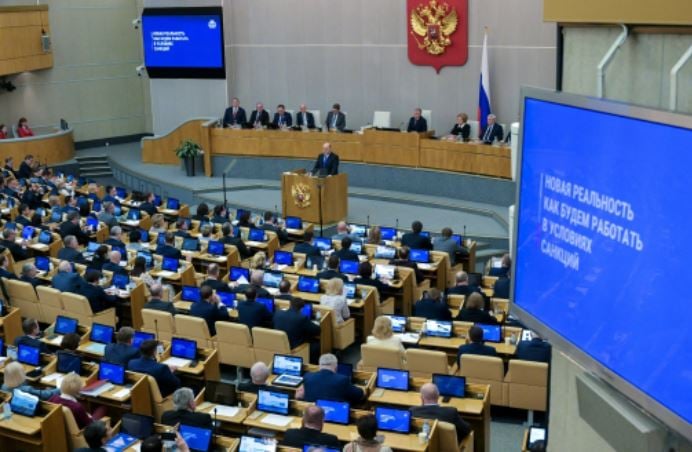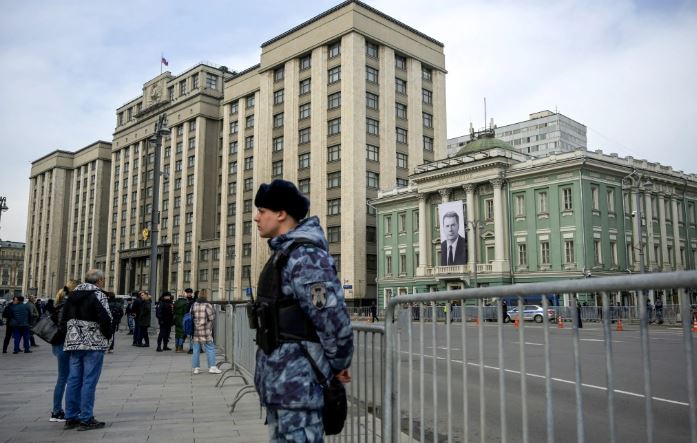Paris, May 18, 2022 – The Russian State Duma should withdraw a draft law that would facilitate the arbitrary shutdown of media outlets and increase the number of journalists prosecuted for sharing information, the Committee to Protect Journalists said Wednesday.
The State Duma, the lower house of Russia’s legislature, is set to consider legislation that would allow authorities to invalidate the registration and accreditation of media outlets without a court order and hold newsrooms accountable for information they republish, according to multiple news reports. The Duma was initially scheduled to consider the bill during its May 18 session, but the examination was postponed to May 24, Aleksei Obukhov, editor for independent news outlet Sota.Vision, told CPJ via messaging app.
On March 4, President Vladimir Putin enacted amendments to the Russian criminal code imposing prison terms for spreading “fake” information about the country’s military. On March 25, Russian legislators expanded the law and introduced punishment for “false” coverage about the country’s government agencies abroad.
“While the Russian landscape of independent media has been drastically shrinking since the adoption of the legislation on ‘fakes’ about the Russian army and government agencies abroad, this bill is a further blow to press freedom and effectively prevents the existence of any reporting that contradicts the government’s policy,” said Gulnoza Said, CPJ’s Europe and Central Asia program coordinator, in New York. “The State Duma should not pass this proposed legislation, and authorities must allow the media to work freely.”
If passed, the bill would give the Prosecutor General’s Office the power to arbitrarily invalidate the registration and revoke the license of media outlets by simply submitting a request to Russia’s state media regulator, Roskomnadzor, according to CPJ’s review of the bill.
According to those reports, under the legislation the office can shut down any outlets it determines to be:
- discrediting the Russian military
- disseminating “false information” about the Russian military
- distributing anti-war appeals
- distributing calls for rallies
- disrespecting authorities
- spreading fakes causing various threats to society
Under the current law, media outlets can only be forcibly shut down by a court.
“The situation in which the Prosecutor General’s office can close any media outlet simply because they don’t like it will be formally legalized, but this has been a de facto situation for a long time now,” Obukhov told CPJ.
In addition, the proposed legislation would amend the country’s law on media and would make journalists in Russia liable for republishing information, those reports said; however, in the law’s current form, it is unclear how authorities will prosecute the journalists. Under the current law, editorial boards are exempted from responsibility when citing other outlets’ materials.
The draft law also grants the Prosecutor General’s Office the right to ban foreign media from Russia and revoke its correspondents’ accreditations as a retaliatory measure.
According to Obukhov, the draft law does not bring significant changes but rather “legalizes a status quo.” “There are no independent media outlets left in Russia in their classic sense, with websites and reporting,” Obukhov told CPJ. “All of them are either blocked or have suspended their activity.”
Obukhov added that most independent news outlets have migrated to social media and Telegram, which are more challenging to block since Russians still need spaces to communicate.
Separately, on May 30, the State Duma is scheduled to consider legislation that would create a unified register of foreign agents, to which authorities can add any journalist and media outlet subject to alleged “foreign influence” without proof that they received money from abroad, according to reports.
CPJ emailed the Russian State Duma for comment but did not receive any reply.
Committee to Protect Journalists























































